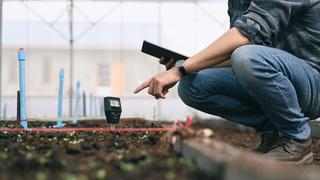Raspberry Pi’s and Produce: Community Garden Increases Harvest with Help from the Society of Physics Students
Undergraduates in Saint Joseph’s Society of Physics Students are utilizing their programming and electronic skills to support human services organizations in the area by partnering with the University’s community garden.

Did someone say raspberry pi?
We’re not talking about the fruity dessert, but an innovative technology to help yield a healthier harvest.
Raspberry pis are low cost, credit-card sized computers that can be plugged into a computer monitor or TV. Saint Joseph’s chapter of the Society of Physics Students (SPS) are putting these mini computers — and their programming skills — to use by partnering with the University's community garden.
Established in its current campus location in 2019, the community garden is a student-run, volunteer-based project that provides fresh produce grown right on Hawk Hill to local organizations, food banks and more.
President of the Society of Physics Alex Manduca ’22 came up with the idea of taking the project one step further through a community garden tech initiative. Manduca launched this project as a way for physics and computer science students to get involved in creating automation for the garden.
“Small computing devices will help SPS and the community garden monitor soil conditions, pH levels in the soil, the nutrients in the soil if it needs to be watered, and so on,” says Manduca.
Small computing devices will help SPS and the community garden monitor soil conditions, pH levels in the soil, the nutrients in the soil if it needs to be watered, and so on.
Alex Manduca ’22, president of the Society of Physics Students
Bill Wolff, Ph.D., associate professor of communication and media studies and director of the community garden, was grateful to have Manduca’s partnership.
“We’re always looking for opportunities to collaborate with people across campus,” says Wolff. “Alex’s initiative sounded like a great way to maximize growth in the garden.”
With the help of SJU’s Green Fund, the SPS has purchased all necessary components to provide garden volunteers with status updates of garden and soil health. The raspberry pi’s will help measure different aspects of the garden environment.
“We will attach the raspberry pis to humidity sensors, salinity sensors and more. These sensors will tell us information about the health of the garden,” says Manduca. “Currently, if there is a problem in the garden, like the soil being too acidic, we won’t know until it is too late. These sensors will let us know in advance if there's something wrong in the garden and may prevent deficiencies in the soil that could negatively impact produce yield.”
In addition to sensors, Manduca is facilitating the use of 3D printing that will provide students materials to create enclosures for the plants.
“The enclosures will be waterproof and weatherproof,” says Manduca. “We’ll then be able to put whatever sensors are needed into the soil, regardless of sensitivities to the elements.”
This technology will also incorporate the use of solar energy.
“It's all sustainable, renewable energy,” says Manduca. “And, you don't have to worry about running cables from the garden into some building, which could present a myriad of problems.”
The SPS will have the opportunity to apply the skills learned in class to real-world situations, helping to positively impact the community.
“The mission is to give back to the community, especially at this time when people are out of work and there's lots of food insecurity everywhere,” says Wolff. “Over the years we've donated over 930 pounds of food to various places. This year alone we donated 453 pounds of food.”
With the extra help of these technologies, the garden is sure to thrive this harvesting season. Don’t forget to check out the community garden this spring to see it all in action!
